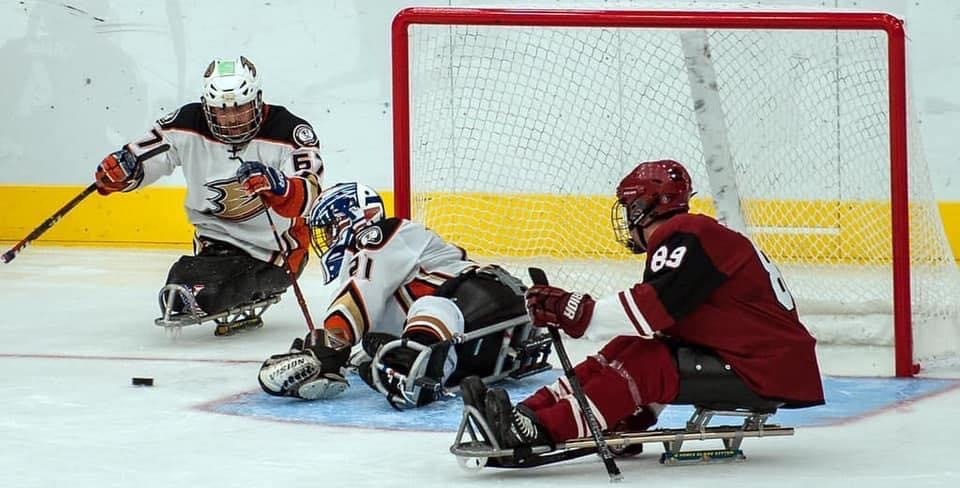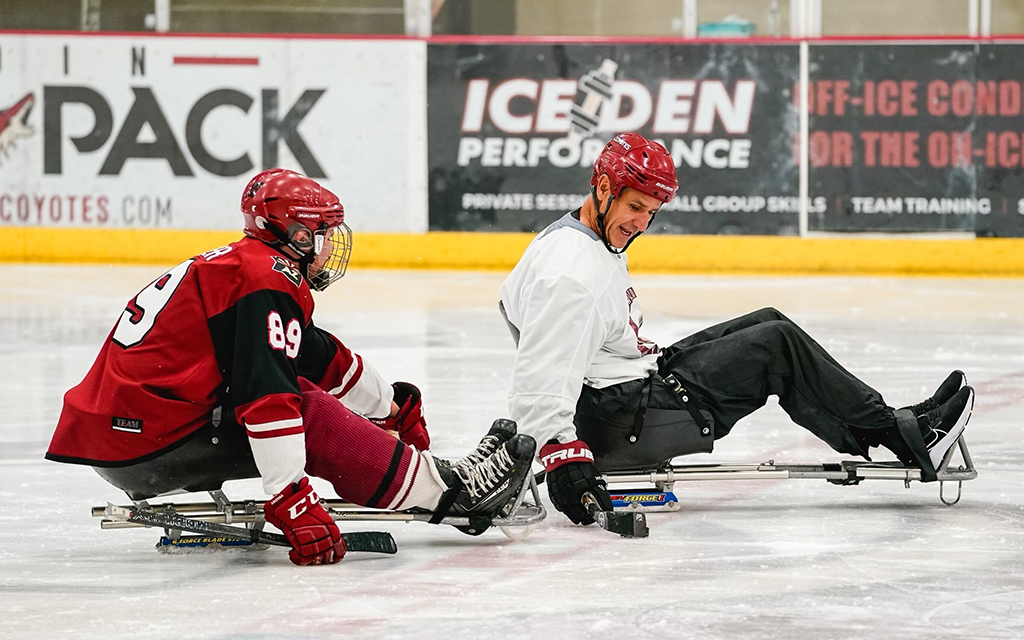
Members of Coyotes Sled Hockey gather for a team huddle at practice, where they exude the spirit of unity and teamwork. (Photo courtesy of Joshua Gromer)
SCOTTSDALE – An ice hockey rink’s characteristics are unmistakable.
The crunch of skate blades digging into the ground, the chilly air and smell of ice can be easily recognized by all hockey players, regardless of their origins or skill level. These lasting sensations remain in an athlete’s head well past their playing careers – mementos they grasp from the game they love.
A passion for ice hockey keeps members of Coyotes Sled Hockey, a team open for any mentally and physically disabled players, coming back. With only a few differences compared to standard hockey, these individuals can compete at a high level while staying active in an enjoyable fashion.
Founded in 2001, Coyotes Sled Hockey has experienced significant growth over its 23-year lifespan and is now part of the Pacific Sled Hockey League. In addition to participating in various tournaments throughout the year, the organization routinely has games against other sled hockey teams in the western United States, including Las Vegas, Seattle, Los Angeles and New Mexico.
The best part is the league’s commitment to an inclusive environment.
“As far as coming out and trying it, we’re open to anyone,” said Joshua Gromer, the Executive Director of the Coyotes Sled Hockey Association. “It’s good for everyone, it’s hard for everyone. Everyone that tries it comes out and has a really good time. So our whole team is made up of a whole wide range of different disabilities. We have people with chronic conditions, we have amputees, we have spinal cord injuries. Kind of a whole array of different disabilities.”
A member of Coyotes Sled Hockey since 2017, Gromer is currently a player, coach and organizer. While he played non-disabled hockey growing up, Gromer was diagnosed with Lupus, a chronic autoimmune disease, in 2008 that caused a stroke six years later. The episode left him without function in his left leg from the knee down, preventing him from playing competitive hockey again.
Or so he thought.
During his recovery process, Gromer realized he needed to stay active and turned to Daring Adventures, a former non-profit agency that connected disabled individuals with adaptive sports. The organization pointed him to Coyotes Sled Hockey, and after attending his first summer clinic, he was hooked.

Joshua Gromer, right, executive director of Coyotes Sled Hockey, demonstrates his skills on the ice despite his physical challenges. (Photo courtesy of Joshua Gromer)
“I came out once and fell in love, and have been coming back ever since because it reminds me so much of playing able-bodied hockey,” Gromer said. “Being in a locker room with the boys, and the rules are the same, the hockey IQ is the same. The mechanics are obviously different, but it reminded me of (non-disabled hockey) which was really good for me.”
Gromer’s medical circumstances are far from uncommon. One in four adults in the United States have some type of disability, while 12.1% have serious difficulty walking or climbing stairs, according to the Centers for Disease Control and Prevention. And while physical disabilities primarily affect the body, they can negatively impact an individual’s mental well-being.
Frustrations among physically disabled individuals extend beyond simply struggling to complete everyday tasks or being unable to play the sport they love, however. The fulfillment that comes with being part of a team or community is often absent for those with physical disabilities. Such individuals are more likely to experience an array of mental health issues – ranging from depression to post-traumatic stress disorder – due to social constraints, loneliness and isolation and sometimes a lack of integrated care.
These issues are part of what Coyotes Sled Hockey aims to address. Even when athletes decide to give it a try, an adjustment period is still required. After all, no other sport compares to sled hockey. A player essentially sits in a bucket-like sled, equipped with two blades, and uses a pair of sticks with metal picks at the ends to propel themselves forward, while also using the sticks to handle, pass and shoot the puck.
Multiple team members compared the mechanics of playing sled hockey to a rowing machine in a local gym, only more difficult. It’s a sizable learning curve that is rewarding once mastered but also causes athletes to second-guess their decision to take up sled hockey.
“Nerve-racking,” utility player Jim Widen, who sustained multiple spinal injuries while playing hockey, said of his first practice with Coyotes Sled Hockey. “It was like your first day of school. You’re kind of looking around to make eye contact with people so you can bond with some people while you’re doing it. After the first or second practice, you kind of (think),‘These guys are really great.’ We’ve all got similar stories for the most part. They’re apples and oranges, but they’re all still fruit?”
First-day jitters are expected when taking on a new and difficult concept. Coyotes legends like Shane Doan always struggled during their first times in a sled, much to the amusement of Coyotes Sled Hockey members. However, all it takes is for newcomers to see the fun atmosphere at the rink and quickly feel right at home.
A lighthearted vibe at practices and games is the norm for Coyotes Sled Hockey and what appeals to forward Matthew Aleksa. Born with spina bifida, a condition that occurs when the spine and spinal chord don’t form properly, Aleksa was provided with a sense of belonging and a new community when he joined the team earlier this year.
“I think it keeps the motivation stronger and the stress low,” Aleksa said. “Definitely the stress level as well, I think it pushes us harder and shows us not only on the rink can we do anything, but also going forward in life, we can do anything. I think it’s more motivational outside of the rink.”
Gromer described sled hockey’s mechanics as something that is “not a natural deal,” but playing hockey in a sled is also far from the norm. Before players hit the ice, another adjustment process is required: making sure the sled is comfortable and works smoothly. That’s where coach Steven Ortiz’s expertise becomes useful.
A native of San Jose, California, Ortiz began working in the wheelchair accessibility business 14 years ago, which has given him a wealth of experience in using technology to help people with physical disabilities stay mobile. He played hockey for 14 years growing up and was introduced to sled hockey back home, so when he learned of Coyotes Sled Hockey, he knew he needed to get involved.
So in the fall of 2023, Ortiz became a coach. In addition to providing insight behind the bench, he uses his knowledge of accessibility to ensure players are comfortable in their sled, making him a valuable asset to the team.
“We’ll spend some time before practice starts,” Ortiz said. “I usually get there an hour beforehand, make adjustments to people’s sleds. Just get them lined up, talk about it, get them in the sled before we even get on the ice (and) see how they feel balance-wise … Just making it a smooth, comfortable process.”
With an always-positive atmosphere, a competitive schedule and any issues with mobility easily solved, members of Coyotes Sled Hockey are truly enjoying a big-league experience. But establishing and maintaining a well-run program wouldn’t be possible without the help of the Arizona Coyotes when they were active in the Valley.
Their relationship began to blossom about four years ago, according to Zack Savage, the Coyotes’ Director of Hockey Development. While some events the team attends are through USA Hockey, the program receives the majority of its support from the Coyotes.

Coyotes Sled Hockey players with various disabilities, including amputees and those with spinal cord injuries, highlight the team’s mission of inclusivity. (Photo courtesy of Joshua Gromer)
Whether it’s providing extra staff to run practices, paying travel expenses or supplying new uniforms for the team to look as official as possible, the Coyotes’ Foundation provides the team with all of the necessary tools to be successful. And Coyotes Sled Hockey’s support system quickly grew, as former NHLers soon wanted to contribute themselves.
“They do a grant-system style,” Savage said. “As soon as that first grant came in, alumni were like, ‘Oh, we want in, too. We want to supply some additional funds so they can be able to do what they do. And (over) the last couple of years, we’ve now put in our resources, which is coaching, and our resources of what we have in the community, whether it’s extra gloves. (We’re) starting to put those different things in to really enhance the experience.”
With the Coyotes’s recent $1.2 billion sale and relocation to Salt Lake City for the 2024-25 season, the future of Coyotes Sled Hockey remains in the balance. Alex Meruelo, the owner of the now-inactive franchise, has committed his continued support to youth hockey in the Valley, but what does that mean for other organizations that depended on the team to stay afloat?
As of right now, there is no clear answer, and Coyotes Sled Hockey is prepared to pivot to a reality without their biggest financial supporter.
However, no team relocation will ever change the impact the organization has had on so many lives. Coyotes Sled Hockey has helped several physically disabled athletes find a way to keep playing the sports they love, something that provides more than just a good time. It gives them a sense of empowerment and proves to them that they can be successful in life, regardless of what labels are placed on them.
“For me, (being a part of the community) was very eye-opening, because I felt so alone,” Gromer said. “Before I started doing this, I had tried to be a part of support groups, but that just felt like a bunch of people kind of sitting around feeling sorry for themselves. So doing this, we’re doing something and we’re working together to accomplish it.
“But it also really showed me, some of these guys have had their disabilities long than I’ve been alive. And they’re out thriving, they have families, they have jobs. And that really encouraged me, because at the time when I started playing hockey, I didn’t have kids, I wasn’t able to work, and now I run a business and I have two kids. I think a lot of that can be traced back to the group.”
